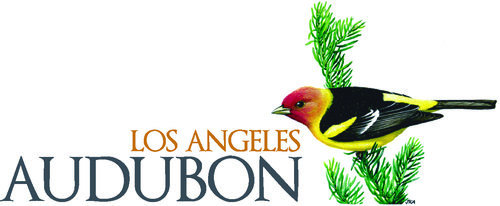Adapting to pandemic conditions has pushed many of us to seek outdoor adventures close to home, visiting spots we may have overlooked or even dismissed in the past. The Park to Playa Trail is an ideal candidate to visit for a walk in a local watershed here in Los Angeles, with 13 continuous miles traversing the Ballona Creek Watershed from the Baldwin Hills all the way to Dockweiler Beach. Plan it right, and you can have your own birding big day, visiting coastal sage scrub habitat, manicured parklands with established tree cover, paved and less-paved stretches of Ballona Creek, and then beach habitat. Basically, gnatcatchers to oystercatchers on a single urban trail.
Summer Fellows: Moving Forward, Working with Nature
Los Angeles Audubon's Summer Fellows Program has been a strong learning resource for many alumni from the Greenhouse Program, Kenneth Hahn Environmental Internship, and the West Los Angeles College Conservation Studies Certificate Program. This program provides hands-on experience along with further environmental education learning. Summer Fellows work on habitat restoration at the Baldwin Hills Scenic Overlook and Kenneth Hahn Recreation Area.
INTERPRETING NATURE: Snowy Plover Retrospective
SNPL, you ask? The Western Snowy Plover has been federally listed as threatened since the 1990s, and various agencies have been monitoring it along the Pacific Coast for decades. LA Audubon has been conducting surveys since 2007. It’s estimated that just 2500 snowy plovers currently breed along the Pacific Coast.
INTERPRETING NATURE — Nature in the City
This issue’s Interpreting Nature column was created by Brian Young. Brian is a Baldwin Hills Greenhouse Program alumnus. He recently returned from completing his degree at UC Santa Cruz to re-join the staff team at Los Angeles Audubon - we are very glad to have him back! Brian brings a wide range of interests and skill sets to his work as a restoration and education staff member, helping students make connections between science, art, and stewardship. Hopefully we can talk him into creating more nature comics for the Tanager in the future!
INTERPRETING NATURE—Birding Bikers and Biking Birders: An Intersection of Two Interests
Whatever the world post-Covid looks like — for me, I hope it includes more birding and more biking. Living in a world that has had and continues to have so much taken by Covid, it has also drawn into relief those things which matter a lot, and for me, I can confidently list: being outside and being active. These are the two no-brainer actions that make my “matter-most” list. Whenever anyone asks me if I want to do an outside activity I answer, “Let’s go!” Under my breath daily I offer thanks into the universe for my family and my job.
INTERPRETING NATURE: Baldwin Hills Greenhouse Program Research Projects — 2019-2020 school year
On June 9th, 2020 the Baldwin Hills Greenhouse Program wrapped up its 12th school year. Despite incredibly challenging circumstances during the spring, Greenhouse Interns did their best to see their projects through to completion. … Each year, we publish the research abstracts in an effort to share the knowledge gained with a broader audience and to acknowledge the interns’ hard work and commitment. This year’s projects include both qualitative and quantitative approaches to better understanding humans and nature in our city.
INTERPRETING NATURE
INTERPRETING NATURE: Book Recommendation to Start You New Year: "Food from the Radical Center"
Growth and Reflection in Joshua Tree National Park
On December 31, 2018 to January 4, 2019 eight Los Angeles Audubon staff and program alumni received the opportunity to participate in a backpacking trip with Outward Bound California in the Joshua Tree National Park backcountry. Both Outward Bound California and Los Angeles Audubon worked together to grant scholarships to all participants. Some of the scholarship recipients were part of the Baldwin Hills Parklands Conservation Certificate Program and others were alumni of the Baldwin Hills Greenhouse Program. Five of the participants that were part of the Baldwin Hills Parklands Certificate Program were Jamie, Racine, Alex, Felistus, Edgar, and Maya. The remaining two, Ingrid and Behtsabe, were Greenhouse Program Alumna. Almost all of us were new to backpacking. Edgar Pedroza and Ingrid Carrillo are currently Los Angeles Audubon staff members and they are also the writers of this reflection. They share their story in the style of a journal where they express their experience through both perspectives.
Western Tanager, Vol. 83 No. 6, Jul–Aug 2017
ON THE COVER
‘I’iwi | Hakalau Forest Wildlife Refuge, Photo by Jack Jeffrey
Found nowhere else in the world, the spectacular scarlet‐feathered I’iwi (Drepanis coccinea) is the last of the sickle‐billed Hawaiian honeycreepers. Before the appearance of humans in Hawaii, more than fifty different honeycreeper species were known to have existed. Today, only 18 species remain, most of these are endangered or threatened. I’iwi feathers were once collected by early Hawaiian bird catchers or “kia manu”, and used for the feathered cloaks of Hawaiian Royalty. I’iwi are still fairly abundant in the remaining high elevation native koa‐ohia forests of Hawaii Island and Maui, but rare on the other major islands. The long down‐curved bill of the I’iwi is a perfect match for the shape of tubular flowers of many native plants, making I’iwi important pollinators of these and other native plants. To see an I’iwi, or to hear its loud “rusty hinge” call is an extraordinary experience and one that can only be had in a Hawaiian rainforest.
In this issue
• YOUNG BIRDERS: Birds of the Hakalau Forest on the Big Island of Hawai’i, By Dessi Sieburth
• INTERPRETING NATURE: Does nature have a place in the English Language Arts classroom?, By Robert Jeffers, L.A. Audubon Treasurer | Instructional Coach
• Princeton Phainopepla Project, Please send your sightings to Dr. Daniel Baldassarre, Princeton University
• Birds of the Season—June 2017, By Jon Fisher
• OPINION: Every Creature on Earth is Under Threat, By Louis Tucker, LAAS Member and Field Trip Leader
• A Tribute to Judy Raskin, By Brad Rumble, LAAS Director at Large








